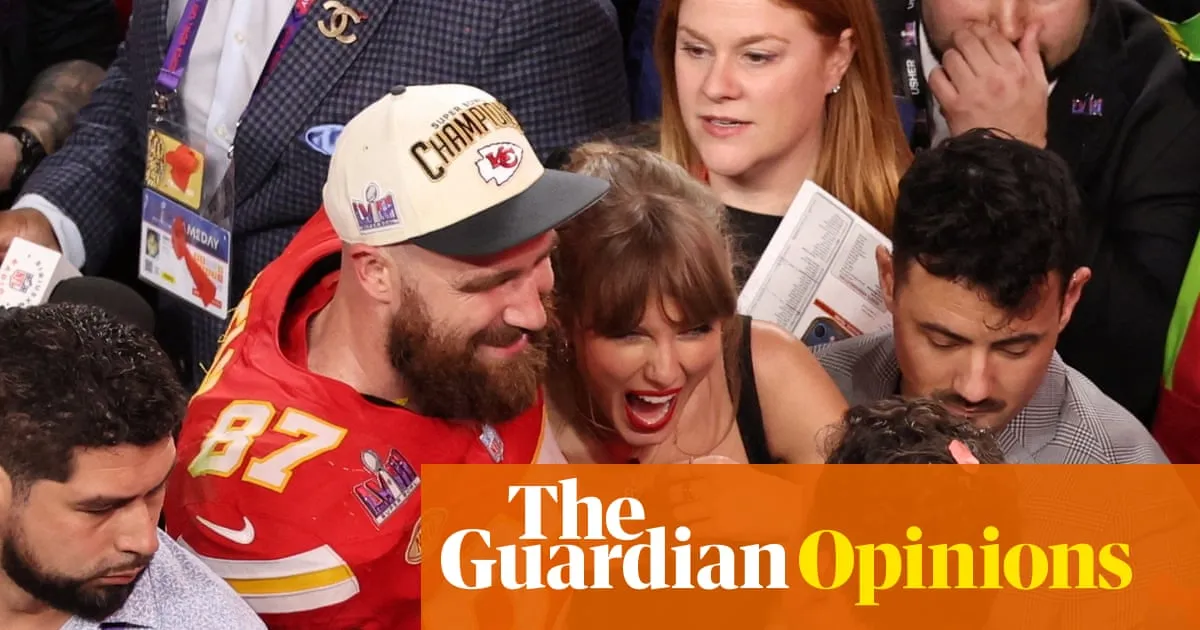
Breaking news alerts buzzed across the globe, sending Swifties into a frenzy as they celebrated the engagement of Taylor Swift, the reigning queen of pop, to Travis Kelce, a football star and podcaster. The excitement was palpable, with even the Prince and Princess of Wales offering their royal approval, and even Donald Trump wishing the couple well. But what does this engagement truly signify?
While it may seem like a straightforward tale of an extremely famous woman and a somewhat famous man enjoying each other's company, the reality is far more complex. Taylor Swift is renowned for embedding hidden meanings and Easter eggs in her music, prompting fans to embark on quests to decipher her lyrics. The fervor surrounding her engagement is no exception.
For instance, last year, a 5,000-word essay published in the New York Times suggested that Swift might be subtly expressing her identity as part of the LGBTQ+ community through coded lyrics. This theory has garnered a significant following, with a subreddit dedicated to “Gaylors” attracting over 50,000 members. Following the engagement news, the subreddit went private to shield its discussions from trolling.
The engagement has sparked contrasting reactions. While some Gaylors mourn the news, various conservative commentators celebrate it as a sign of Swift transitioning from an independent career woman to a traditional wife. Right-wing activist Charlie Kirk voiced his hope that marriage and motherhood might “deradicalize” Swift, who is not particularly known for her radical views. Kirk quipped, “Taylor Swift might go from a cat lady to a JD Vance supporter,” suggesting that motherhood could shift her political alignment.
J.D. Vance, a prominent conservative figure, also weighed in, using Swift's engagement to raise the conspiracy theory that NFL games could be manipulated in favor of Kelce's team, the Kansas City Chiefs. He expressed concern that the NFL might show favoritism due to Kelce's newfound fame as Swift's fiancé.
Interestingly, some Swifties have praised Kelce for being supportive of Swift's success. However, it's essential to approach this narrative with caution. Kelce has made controversial remarks in the past, including calling women “breeders” and defending teammate Harrison Butker after he made derogatory comments about women and Pride month. While Kelce has stated he does not share Butker’s views, his failure to publicly criticize them raises concerns among Swift's diverse fanbase.
The engagement has also drawn the attention of the business world, with experts speculating on how it might influence stocks and marketing strategies. Even niche publications are finding angles to cover this cultural phenomenon. The Swift-Kelce engagement is generating widespread interest across various sectors, showcasing the intersection of celebrity culture and commerce.
While I appreciate Taylor Swift's talent and the joy she brings to many, it is crucial to acknowledge the responsibilities that come with such influence. I urge her to leverage her platform to advocate for critical issues, such as the humanitarian crisis in Gaza. As a public figure, her silence on significant injustices is a choice that cannot be ignored.
In related stories, Dr. Gizela Jagielska faces investigation in Poland for providing a legal abortion after a fatal fetal anomaly was diagnosed. Amnesty International has called for a halt to the investigation, urging authorities to focus on the attacks she has endured.
Meanwhile, Jordon Hudson, a 24-year-old former cheerleader, is trademarking the term “gold digger”, cleverly turning the narrative around her relationship with 73-year-old millionaire Bill Belichick into a business opportunity.
In Italy, police are investigating a porn site that has manipulated images of prominent women, highlighting ongoing issues of harassment and exploitation in the digital age. Additionally, Snoop Dogg expressed discomfort over LGBTQ+ representation in children’s media, revealing a disconnect in his understanding of diversity.
Lastly, Denmark has issued an apology for the forced contraception of Greenlandic women during the 1960s, acknowledging a dark chapter in its history. Reports indicate a continuing gender pay gap in the UK, and a record low fertility rate in England, Scotland, and Wales, reflecting broader societal challenges.
As we reflect on these stories, it’s clear that the intersections of celebrity culture, politics, and social justice continue to shape public discourse.